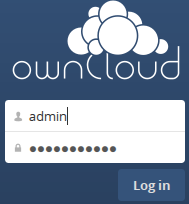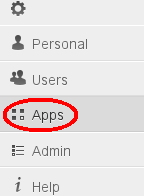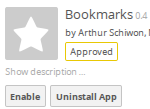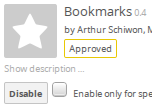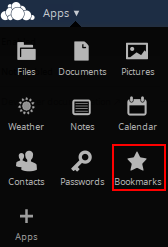Difference between revisions of "Owncloud Applications"
m |
|||
| Line 6: | Line 6: | ||
===About ownCloud Applications=== | ===About ownCloud Applications=== | ||
| − | + | Optional applications can help enhance ownCloud functionality. Some applications are available after the installation of ownCloud as “internal” in a “disabled” state. While other applications are “3rd Party” and are available as “one click” installations (from the ownCloud Application Store) that are automatically downloaded, installed, and “enabled” when from the ownCloud administration settings. | |
| + | Applications internal to ownCloud are supported by the ownCloud project community where 3rd party applications are supported “as-is” by their authors. Many 3rd party applications were developed for specific ownCloud release versions and cannot be used in new or old releases. The “Apps” administration are only displays applications that are rated for the installed instance of ownCloud. | ||
Here is a sample of some ownCloud applications that were tested on Amahi: | Here is a sample of some ownCloud applications that were tested on Amahi: | ||
Revision as of 15:59, 10 November 2012

|
Work In Progress |
|---|---|
| This article is currently undergoing major expansion or restructuring. You are welcome to assist by editing it as well. If this article has not been edited in several days, please remove this template. |
Contents
About ownCloud Applications
Optional applications can help enhance ownCloud functionality. Some applications are available after the installation of ownCloud as “internal” in a “disabled” state. While other applications are “3rd Party” and are available as “one click” installations (from the ownCloud Application Store) that are automatically downloaded, installed, and “enabled” when from the ownCloud administration settings.
Applications internal to ownCloud are supported by the ownCloud project community where 3rd party applications are supported “as-is” by their authors. Many 3rd party applications were developed for specific ownCloud release versions and cannot be used in new or old releases. The “Apps” administration are only displays applications that are rated for the installed instance of ownCloud.
Here is a sample of some ownCloud applications that were tested on Amahi:
| App Name | Description |
|---|---|
| Bookmarks | Bookmark manager. |
| File Move | Move dialog for the “Files” interface. |
| Tasks | Tasks view from calendar. |
| Dependencies Information | Display OwnCloud's dependencies information (i.e. missings modules). |
| Who Share | File attribute extension showing the "Owner" of a shared file/directory. |
Installing/Enable an ownCloud Application
How do you install an ownCloud application?
- To install an application the administration ID will have to be used.
- Click on the Settings Menu item
- Navigate to Settings => Apps
- Move down the list of apps until the name "Bookmarks" appears. Click on this title. Details for the app will appear on the right. Click on the "Enable" button to install and activate the application.
- Once the app is installed the enable button changes to a "Disable" button.
- Logout and login as a regular user. The menu will now show the app button.
- Click on the menu button for the app to execute it.
Disable an ownCloud Application
<add text here>
Removing an ownCloud Application
<create new tip item>
